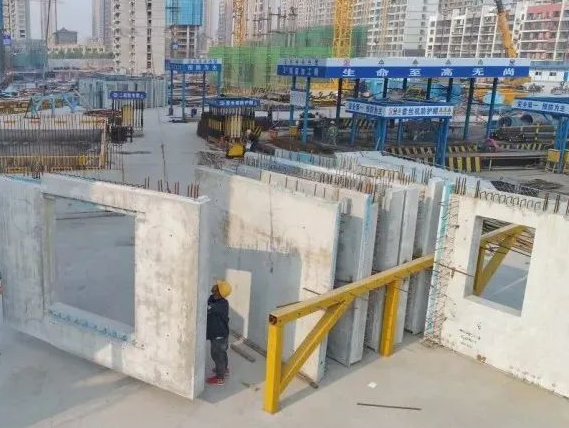The policy, design and cost of prefabricated buildings are understood in one article
With the development of modern industrial technology, building houses can be manufactured in batches and complete sets like machine production.
It is the fundamental transformation of the mode of construction production from extensive production to intensive production.
The definition of prefabricated building: a building assembled by prefabricated parts on the construction site; the definition of assembly rate: within the scope of building evaluation The comprehensive proportion of prefabricated components shall be adopted for the main structure (above the outdoor floor), enclosure wall, internal partition wall, decoration and equipment pipeline..
Assembly is not just “lapping”.
Prefabricated buildings respond well to the requirements of national energy conservation and environmental protection.
At the same time, many components can be reused, which also reduces the possibility of secondary waste pollution.
Like Toledo, prefabricated buildings prefabricate some or all components in the factory and then transport them to the construction site for assembly.
Today, I’d like to share with you the analysis outline of prefabricated buildings from the perspective of Party A 01 overview of prefabricated buildings 02 interpretation of prefabricated policies 03; key points of prefabricated design 04 analysis of prefabricated costs 01 overview of prefabricated buildings / Youde management sharing summary the emergence and development of prefabricated buildings are inevitable, There are two main development trends that have led to the promotion of prefabricated buildings throughout the country.
Building a house is more and more like building a car.
The construction industry and industrialization use the modern management mode through standardized architectural design and modular and industrialized component production, Realize the generalization of building components and the assembly and mechanization of on-site construction.
02 interpretation of prefabricated policy / sharing of Youde management in terms of prefabricated buildings in China, the planning of prefabricated buildings has been intensively issued since 2015: the evaluation standard for industrialized buildings was issued at the end of 2015, which decided to comprehensively promote prefabricated buildings in China in 2016 and made a breakthrough; On November 14, 2015, the Ministry of housing and urban rural development issued the outline for the modernization development of the construction industry.
The main components of prefabricated buildings are manufactured in the component processing plant and transported to the project site for assembly.
It is planned that prefabricated buildings will account for more than 20% of new buildings by 2020 and more than 50% of new buildings by 2025; On February 22, 2016, the State Council issued the guidance on vigorously developing prefabricated buildings, requiring the development of prefabricated buildings such as prefabricated concrete structure, steel structure and modern wood structure according to local conditions, and strive to make the proportion of prefabricated buildings in the area of new buildings reach 30% in about 10 years; The government work report on March 5, 2016 proposed to vigorously develop steel structures and fabricated buildings and improve the standards and quality of construction projects; On July 5, 2016, the Ministry of housing and urban rural development issued the list of prefabricated building science and technology demonstration projects planned by the Ministry of housing and urban rural development in 2016, and published the list of prefabricated building science and technology demonstration projects of science and technology projects in 2016; On September 14, 2016, the State Council held an executive meeting of the State Council, which proposed to vigorously develop prefabricated buildings and promote the adjustment and upgrading of industrial structure; On September 27, 2016, the State Council issued the guidance of the general office of the State Council on vigorously developing prefabricated buildings, which defined the key areas for vigorously developing prefabricated buildings and steel structures, the proportion of prefabricated buildings in new buildings in the future, and the key development cities.
As long as the prefabricated building components are transported to the construction site, we can imagine the pre prepared components such as beams, plates, columns and walls as Lego blocks, which only need to be put together at the construction site.
Not only the components themselves continue to reduce the impact on cement, sand, stone The consumption of steel reduces the environmental pollution on the construction site.
Because the policy requirements for prefabricated buildings are different all over the country, the author mainly combines the national Analysis of relevant policies in Guangdong Province interpretation of assembled building policies — the national policy on prefabricated buildings is mainly based on the evaluation standard for prefabricated buildings (GB / t51129-2017).
Therefore, this industrialized and industrialized building has been widely used in Europe, America, Japan and other countries and regions.
First, the trend of energy conservation and environmental protection.
This is the prefabricated building.
Secondly, the construction industry and industrialization trend.
After the prefabricated components are transported to the construction site, the lapping and pouring of reinforced concrete will be carried out to ensure the safety of the assembly room.
